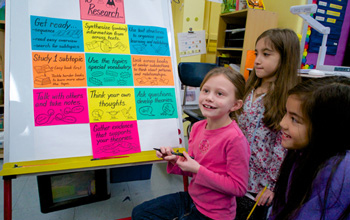Brand-new Units of Study in Writing for Grades 3-5 Now Available!
A Workshop Curriculum, Grades K-8
Lucy Calkins and the Units of Study coauthors aim to prepare students for any reading and writing task they will face and to turn kids into life-long, confident readers and writers who display agency and independence. Lucy and her colleagues have drawn on their more than 30 years of research and work in thousands of schools across the country and around the world to develop powerful curriculum resources, instructional methods, and professional learning opportunities to support teachers as they work together and with their students toward these vitally important goals.
Why Workshop?
The Reading & Writing Project�s approach to instruction recognizes that �one size fits all� does not match the realities of the classrooms and schools in which they work. When you walk into a workshop classroom at any given moment, you�ll see instruction that is designed to:

- help teachers address each child�s individual learning,
- explicitly teach strategies students will use not only the day they are taught, but whenever they need them,
- support small-group work and conferring, with multiple opportunities for personalizing instruction,
- tap into the power of a learning community as a way to bring all learners along,
- build choice and assessment-based learning into the very design of the curriculum,
- help students work with engagement so that teachers are able to coach individuals and lead small groups.
The routines and structures of reading and writing workshop are kept simple and predictable so that the teacher can focus on the complex work of teaching in a responsive manner to accelerate achievement for all learners.
Reading and Writing Bill of Rights
- 1
Above all, good teachers matter. Learners need teachers who demonstrate what it means to live richly literate lives, wearing a love of reading and writing on their sleeves.
- 2
Students need a comprehensive approach to English/language arts, one that includes a responsive approach to the teaching of both reading and writing. Researchers have studied examples of exemplary literacy instruction. In every case, when they found a classroom with high literacy engagement, they found this kind of comprehensive teaching in place.
- 3
Reading and writing need to be taught like other basic skills, with direct, explicit instruction� including spelling, conventions, and the skills and strategies of proficient reading and writing.
- 4
Readers need long stretches of time to read, and writers need extended opportunities to write.
- 5
Writers need to learn to use writing process: rehearsing, drafting, revising, editing, and publishing their writing. Readers need opportunities to consolidate skills so they can use skills and strategies with automaticity within fluid, engaged reading.
- 6
Writers deserve to write for real, to write the kinds of texts that they see in the world, and to write to put meaning onto the page. Readers need opportunities to read high-interest, accessible books of their own choosing.
- 7
Readers and writers need teachers to read aloud to them.
- 8
Students need opportunities to talk and sometimes to write in response to texts.
- 9
Readers need to read increasingly complex texts appropriate for their grade level and they need support reading nonfiction and building a knowledge base and academic vocabulary through information reading.
- 10
Learners need clear goals and frequent feedback tailored specifically to them. They need to hear ways their reading and writing is getting better and to know what their next steps might be.

